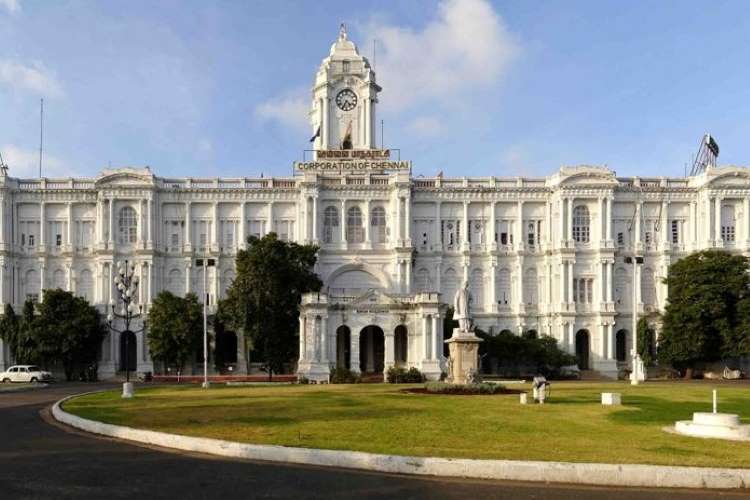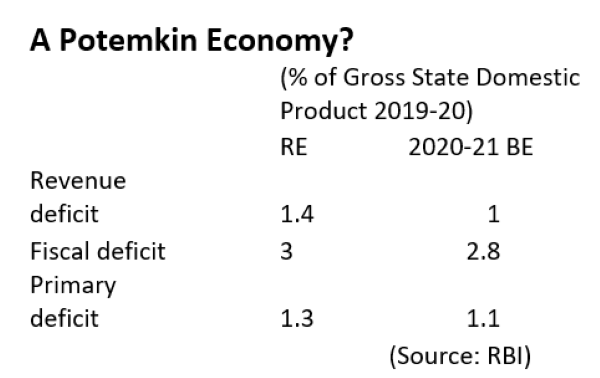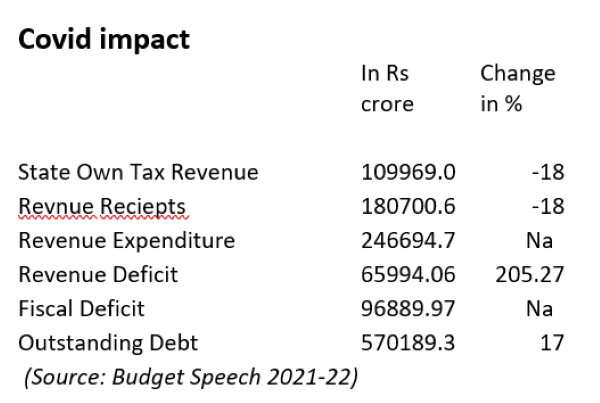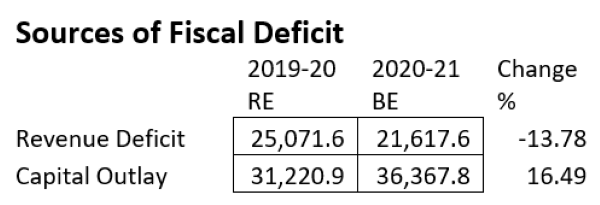
Tamil Nadu economy staring at a crisis: There is something curiously common between the Covid-19 pandemic, the new age plague that has been raging across the globe, and the rise and rise of welfare politics. Both are coming back with a vengeance when everybody thinks they were behind us. And the former is reinforcing the latter in more than one ways. From Washington to New Delhi and from Chennai to Kolkata, welfare politics is the flavor of the season. There is a groundswell of support for the idea of activist government that takes care of its citizens amid unprecedented human misery and rising poverty.
Arguably, governments stepping in to support its citizens, especially the underprivileged, with free public goods and amenities form the core of the social contract in a modern democracy. There is nothing wrong there and in fact it is the right thing to do when millions are tumbling out from the so-called middle class to the bottom of the pyramid. It is believed that spending the way out of the crisis is the only available option, though finding the means to fund such schemes remains a concern for governments. Tamil Nadu is no exception. The state has a long legacy of welfare politics that has now achieved a sort of religious status. Questioning any outlandish promises made by the rival political fronts sound sacrilegious. Most of the election promises are devoid of any economic, political or social merit.
READ I Human development challenge: Need to address new forms of inequalities created by Covid-19
Tamil Nadu economy and welfarism
Personality heavy identity politics has been holding the sway for many decades in the Dravidian heartland. Welfare politics has become more than an ideology there. This mirrors in the promises made by the rival fronts in the state in the run-up to the elections to the state legislature. With the state’s political theatre bereft of any larger-than-life superheroes from the tinsel world or any ideologue or demagogue capable of swaying the outcome in the battle of ballots, it was only natural for rival political fronts to shower promises to woo the voters. Much of the promises made by rival fronts do not mean to make any changes in the life of citizens, nor do they make any economic sense other than adding up to the stress on the already stretched finances of the state government. The promises are hard to keep and poll promises are seldom kept.
The officials and the official economists in Chennai maintain that Tamil Nadu economy has created a model to achieve social justice and upward mobility of citizens, who are trapped in the caste-ridden society. It is true that the reservation system in state government hiring was instrumental in lifting a large chunk of lower caste people out of poverty and stigma, paving the way for their upward socio-economic mobility. However, these efforts did not do away with the caste system. In fact, the rise of a new class has spurred the appeal for caste-based politics in the state ever since. The pioneering noon meal scheme introduced by the state government was the watershed event that brought lakhs of children to the schools. But higher school enrollment did not end the malice of child labour that is still rampant in the state.
This is not to say that welfare politics has not done any good to the state. To give the devil its due, it has worked seamlessly for the state administration for years as Tamil Nadu economy has been growing at a faster clip than the national average for decades. It also gave birth to a new class that swelled the middle-class strata of the population. The rise of this `new class’ also reinforced economic growth since they are also consumers of goods and services. No dispute there. With tax money filling the state’s exchequer to the brim, administration after administration found no reason to worry about financing its numerous welfare schemes and borrow more with impunity. Headline indicators of Tamil Nadu’s finances support this line of thinking till the pandemic hit the state.
READ I Covid-19: Kerala will need to take tough decisions
A look at the key financial ratios of the Tamil Nadu economy shows that everything looked hunky dory till the virus outbreak. If deficit ratios are to be believed, then the state was a model for diligent management of its finances with all key indicators flashing dark green on a relative scale. (See Table I)

On a wing and a prayer
As the old saying goes, the devil is in the details. A closer look at the state finances shows Tamil Nadu has been living dangerously over the years, with the Covid-19 pandemic bringing its once formidable economy to its knees. (See table II)
With the Tamil Nadu economy budgeted to grow from the pandemic lows at a tad over 2% in the current fiscal, it is going to be a long road for the state to claw back to its pre-Covid activity and output levels. This means that given the budgeted 2% growth, it is going to be a race to the bottom for Tamil Nadu among the pecking order of states when it comes to reaching the pre-pandemic output and income levels with its attendant ripple effects on jobs, consumption and social security.

Worse, there is a secret about Tamil Nadu, billed as south India’s most vibrant economy, that nobody cared to see. The state has been evergreening its loans meaning borrowing more and more to finance its legacy debt and service interest payments. As of last fiscal, the state has been financing its annual income gap or fiscal deficit through fresh market loans. Market borrowing as a source to fund its fiscal deficit has increased from 91.22% as of the revised estimates of 2019-20 to 94.39% in 2021-21 budget estimates. This critical ratio reveals the fact that the state has been living dangerously by borrowing to meet its needs.
Since such facts cannot be disputed, chickens are finally coming home to roost for the Tamil Nadu economy as the state finances are vulnerable unless macro-prudential measures to salvage the economy are taken at a war footing. This is all the more important as revenue deficit, a proxy for unproductive expenditure accounts for the lion share of the state’s fiscal deficit. Given the state of state finances, there is no silver bullet in sight that can bring the revenue deficit under control in the foreseeable future. (Table III) However, to give the credit wherever it is due, the state has budgeted for a 16% growth in capital outlay – investment in new income generating assets – that will bear visible outcomes but with a time lag.

All is not lost
This is not to say that all is lost for Tamil Nadu economy. Far from such doomsday prophecies, there is a compelling case to believe that the state still can stage a comeback from the brink, provided the new administration toes a more sensible line without going for an expenditure reduction and stepping up welfare schemes such as food for all that makes economic sense while pulling away from splurging its resources on wanton spending that does not make any economic sense. To say the least, for the new administration taking charge at the state secretariat, managing finances is going to be a trial by fire.
Tamil Nadu economy is in a precarious position. More than 90% of the state’s fiscal deficit is financed through interest bearing market borrowings. The new government just needs to take one wrong step to send the state finances flying off the cliff. Tax revenue had hit a plateau with no scope for further expansion. The subsequent hard landing of the state economy and its aftershocks may be unfathomable at this point, not unimaginable. Still, the economy can be steered clear of danger if the new administration brings sanity to decision making process, minding every penny it spends. The situation warrants the undivided attention of policy makers in the next five years, irrespective of who wins the elections.
(P Vinod Kumar is Kochi-based independent economist and commentator. Views expressed in this article are personal.)
